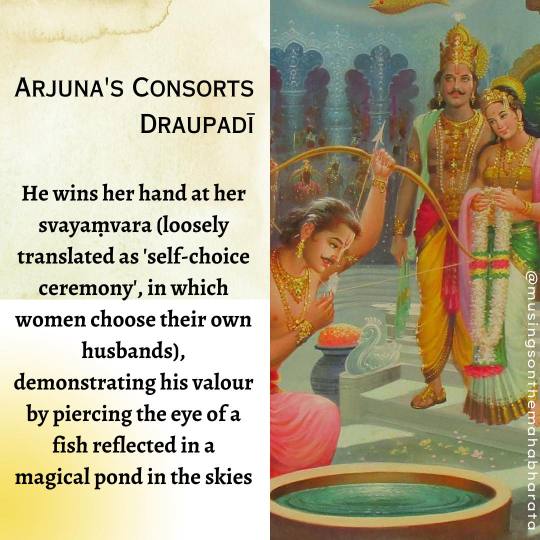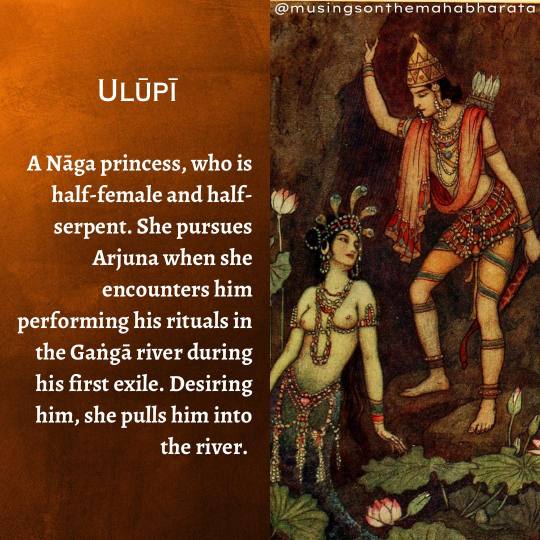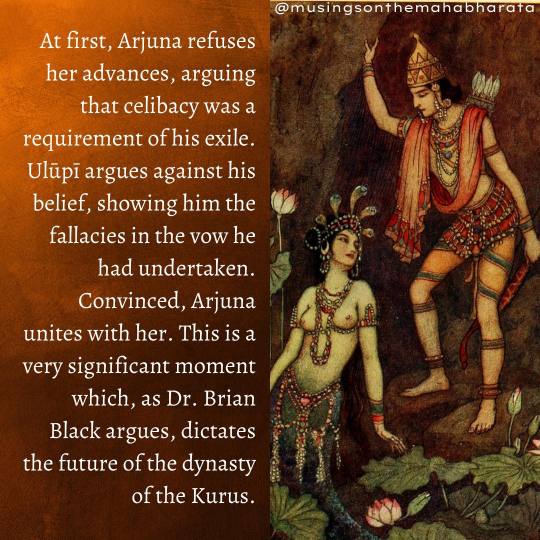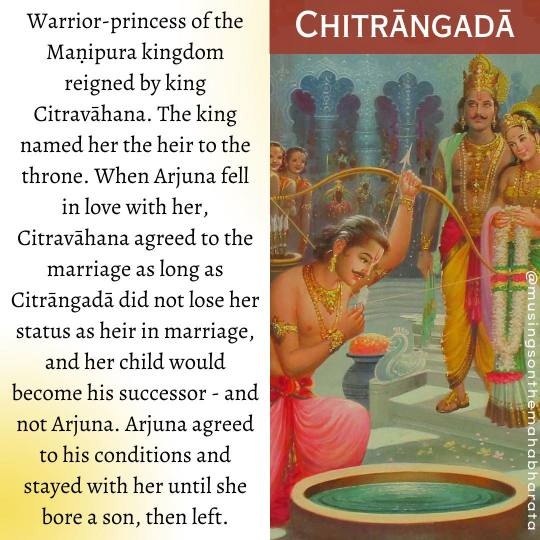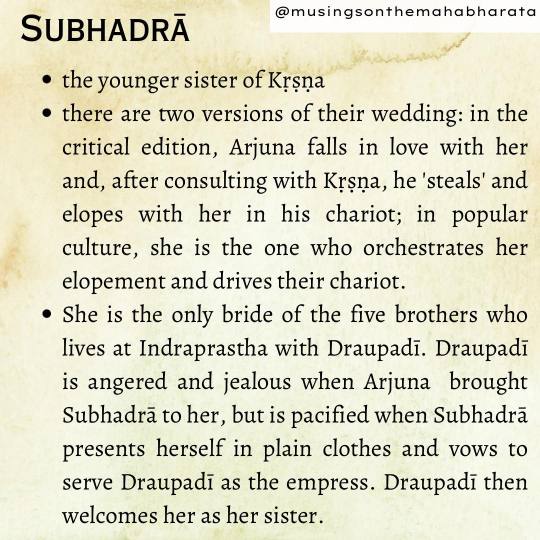Text
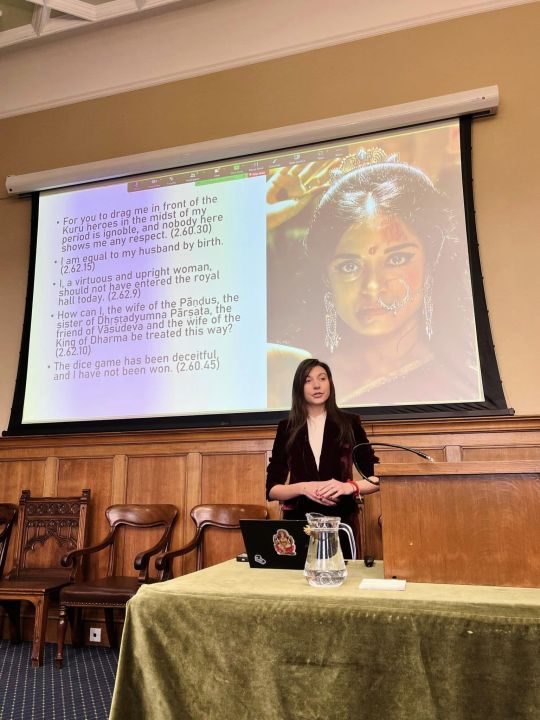
a joy to present my PhD work at the School of Divinity [Edinburgh] yesterday on my first research panel 😊 i talked about the gendered politics inscribed in the body of Draupadī, the Mahābhārata's heroine. i argued that it is significant that a text such as the Mahābhārata, which holds so much religious, cultural and spiritual weight, includes the story of a sexually assaulted woman, and, moreover, one of divine origin, because it offers women subjected to gendered violence the opportunity to unearth psychological comfort in Draupadī's story, and the opportunity to shed shame and fears of impurity rooted in varied internalisations of social or religious messages. through the prism of shared experience, the trauma is voiced and processed, which percolates in the social stratum, where, by claiming and reimagining Draupadī's symbol, women ask for and enact socio-political change. i am exploring this movement in my thesis. ❤️🔥
astounding to listen to & learn from the presentations of the colleagues who shared the panel with me, and to engage with the work differently during the q&a portion; openings to approach the work differently, freshly, in ways i wouldn't be prone to without external stimulus.
thank you @ishitahp for the photos & video! 🫶
#draupadi#mahabharata#mahabharat#phd#phd student#academia#women in academia#mahabharatam#yajnaseni#religion#gender#feminism#female empowerment#female experience#itihasa#hinduism#south asia#pooja sharma#draupadi art#draupadi's disrobing#krishna
12 notes
·
View notes
Text

shame is learned. celebrating autonomy & the potential to unlearn & deprogram conditioned thought processes. my poem for yesterday's international women's day. poem from my poetry collection, songs of youth. written in 2017 after learning about a case of gendered violence which happened in my home country, and reading social media comments attached to news about it. it made me realise how the dynamic that leads to such violence was being (and is) continuously perpetuated in social spaces in different forms (such as speech, enforcing gendered constructs) & how women were active agents in its perpetuation as well. to unlearn is to become free.
#international women's day#women's day#women's poetry#poet#poetry#poetess#songs of youth#female empowerment#feminism#gender#gendered violence#literature#poetry collection#shame#misogyny#women's rights
3 notes
·
View notes
Text
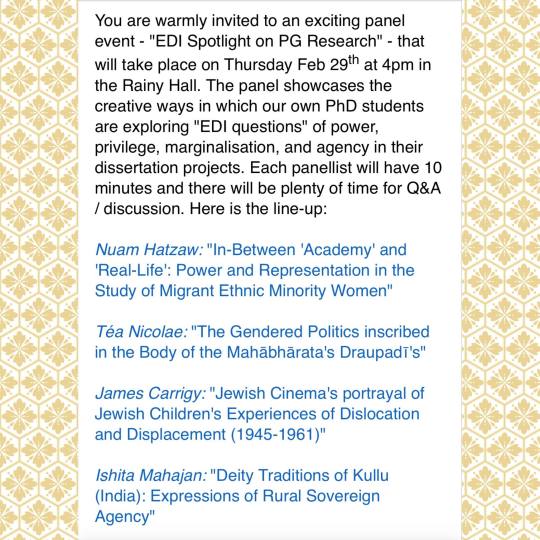
honoured and very excited to share that i will be presenting the progress i have made with my research at Edinburgh University's School of Divinity, at a panel organised by EDI tomorrow, on the 29th of february! my presentation is entitled "The Gendered Politics Inscribed in the Body of the Mahābhārata's Draupadī". ❤️🔥 this will be my first research panel! 😊
7 notes
·
View notes
Text

on writing as an act of transcendence
the beautiful image is a painting of Sarasvatī that belongs to a set of sixty which chronologically depict a tale told in the Mahābhārata (as well as in the Mārkaṇḍeya Purāṇa and in the Śrīmad Devībhāgavata), that of King Hariścandra. this painting is one of two beginning the set, and it depicts the invocation of Sarasvatī, the Goddess of knowledge, speech and poetry, who is invoked as the flow of (and to flow the) words and wisdom of the telling. Gaṇeśa is invoked, as well.
in a seminar i recently went to, we discussed sacred texts, and the invocation of Gods & Goddesses in their openings - the muse in the Illiad, the deities in the Sanskrit texts etc. it made me reflect on writing as an inherently transcendental act. as in, it is not you who writes (or creates etc). it is being written through you, and it is therefore futile to take ownership for it.
as a 'writer', i oftentimes read my work and feel as if it was written by someone else. of course, my biases seep in (in editing, especially), but if i fully connect, the experience is that of it being written through me, and not by me.
i understand the invocation of the muses and Goddesses to reflect, in part, this understanding: that the act of creation subsumes and transcends the self or ego, even if only momentarily. that in creating, we tap into and open pathways within that we usually do not access customarily, when we are so entrenched in our sense of self that the energy can only flow in one way (that of sustaining our identity and the patterns which construct it). in creating, the energy can be freed to flow in new or in more ways. this is how i understand the surrendering to the muse or to one's art that is so lauded by poets. 🦢
23 notes
·
View notes
Text

i have been exploring the algorithm of the Mahāvidyā Kamalātmikā through sound pathway as facilitated by the AshZero offering of "Sounds of Śakti" for which @lensonearth created a series of sounds distilled from bījā mantra. the sounds are not chants nor articulated resonance; instead, they are what we see as a container through which sound is projected as shape. this model of absorption is a near non-linear oral transmutation which aims to follow the siddhānta (algorithm) of ṛṣi darśanāta (to understand more, watch "Vedas: All You Wanted to Know" by Dr. Kesarkar which expounds on how the Vedas originated from sound: https://youtu.be/mK6KdrmyOcg?si=t7vuad5g9kiLXCyF).
after experimenting with various abstract sound combinations for a week, i began continuously looping through one particular waveform.
with the awareness that it is in our humanness to prefer what is amiable and to make choices (such as that of which sound to absorb) based on what resonates with our sense projections, i aimed to renounce any bias and to absorb the sound for 3 weeks without expectations, familiarity or target. i listened to it in the morning and in the evening, 4 times each round.
gradually, the sound became integrated in my system; i became able to access it spontaneously, in the sensory exchanges occurring in my regular days. i noticed change in my perception of the events arising in my life as well as in my actions. as instructed, i aimed to avoid the natural urge to linearly make sense of it or to differentiate positive and negative effects arising of this flow. thus, i will not pinpoint what exactly changed in my life through the means of this sound, nor do i think it would be feasible or fruitful, as it causes validation toward a process - which is not the aim of application-based Tantra.
however, as an exercise, i decided to jot down the unfolding of a sound exploration that transpired in my first night in Rishikesh without any rationale other than an opening to the process possibly unlocking something within without a specific subconscious target.
i'm not sharing this with the intention to construct a mystical halo. mystical / energetic experience is ultimately just an experience - it can greatly help us open or gain clarity, but it's important not to get caught up in it. the experience i am sharing simply demonstrates how sound can be absorbed by the system and nothing more, and has no inherent specialness.
as i sat by the Gaṅgā, the sound i have been imbibing spontaneously rang in my right ear at low volume. after a small dram of whisky taken as sacrament, the sound boomed in both of my ears. my heartbeat increased and various bodyparts, such as navel, feet and hands began pulsing. what i understand as "pleasure pathways" in my system fired. followingly, i directly listened to the sound with headphones, eyes open. after i finished listening, the sound overturned my thoughts and my experience became an immersion in the five senses (sight, touch etc).
sacrament choice: 6 y/o Highland Park independent bottle, 60.1%, which i got from Cadenhead's at a Whiskybaba.in immersion in summer - i'm not a fan of OB (original / official bottling) of Highland Park but their IB (independent bottling) i think is a must try.
#tantra#tantrika#sound#breath#sound breath#yoga#kamalatmika#mahavidya#mahavidyas#ashzero#the ash zero experience#whisky#india#rishikesh#whiskybaba#practice#siddhanta#algorithm
7 notes
·
View notes
Text
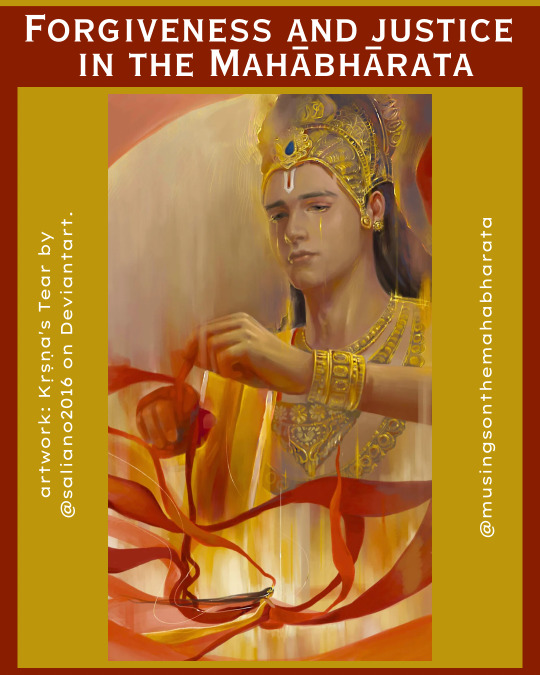
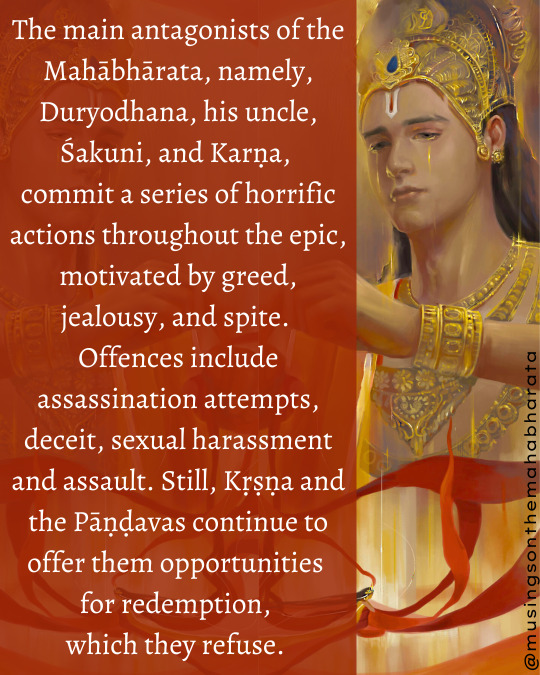
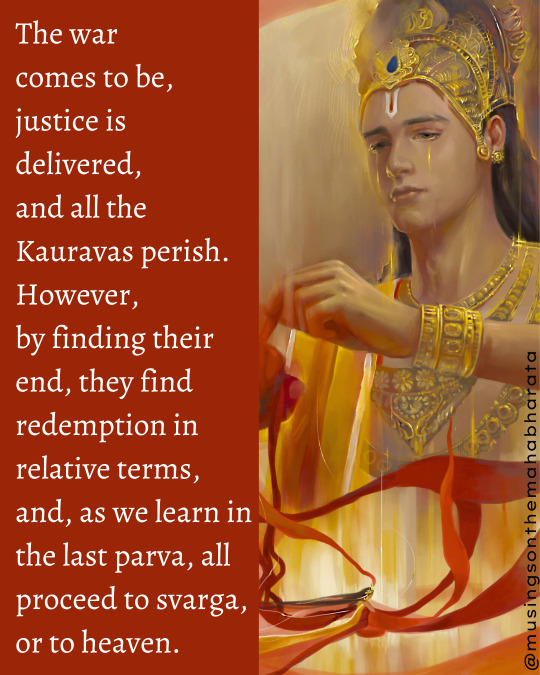
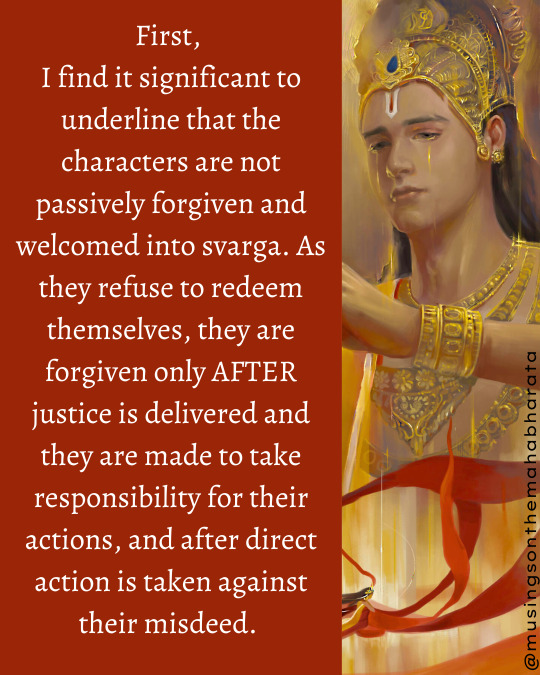
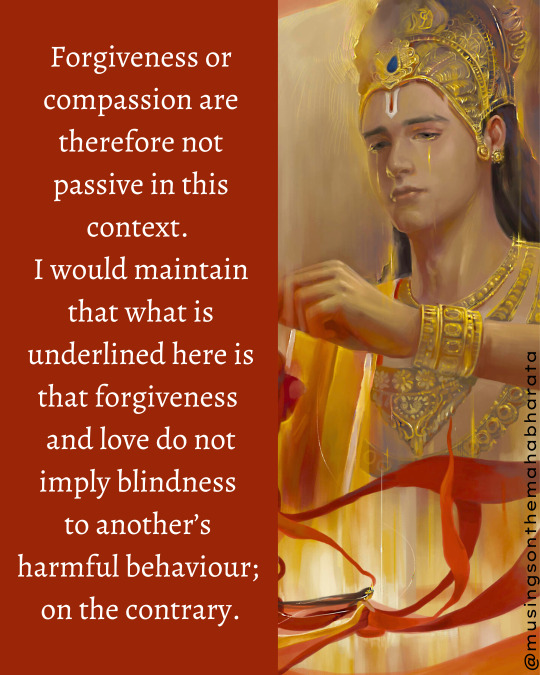
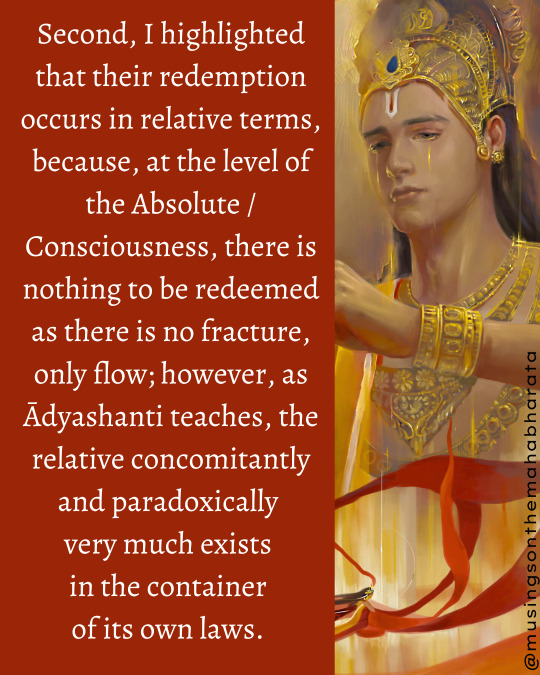
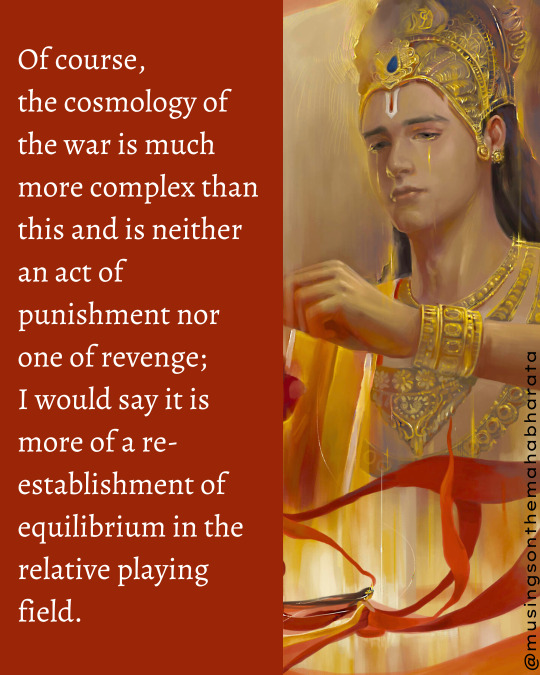
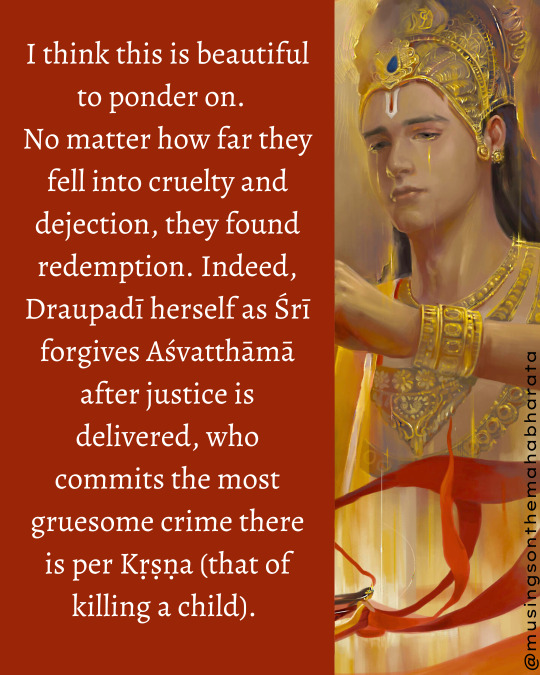
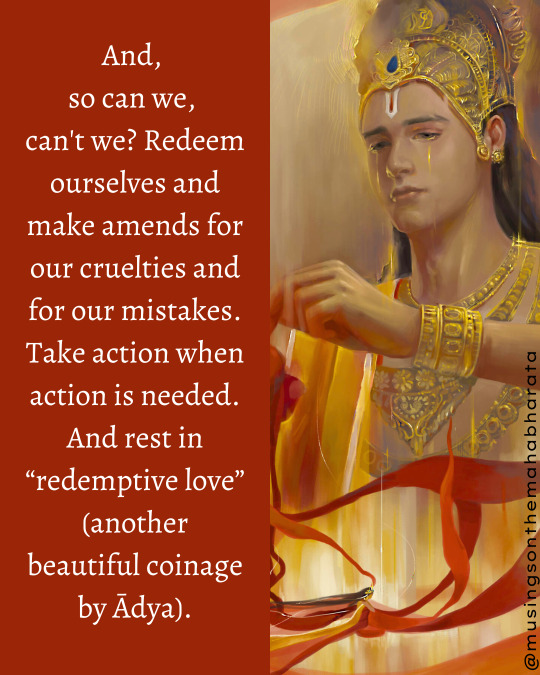
Forgiveness and Justice in the Mahābhārata
The main antagonists of the Mahābhārata, namely, Duryodhana, his uncle, Śakuni, and Karṇa (yes, if antagonists are to be named, Karṇa is one per the Critical Edition and per Kṛṣṇa’s comments) commit a series of horrific actions throughout the epic, motivated by greed, jealousy, and spite. Offences include assassination attempts, deceit, sexual harassment and assault. Still, what I love is that Kṛṣṇa and the Pāṇḍavas continue to offer them opportunities for redemption, which they refuse. The war comes to be, justice is delivered, and all the Kauravas perish. However, by finding their end, they find redemption in relative terms, and, as we learn in the last parva, all proceed to svarga, or to heaven.
First, I find it significant to underline that the characters are not passively forgiven and welcomed into svarga. As they refuse to redeem themselves, they are forgiven only AFTER justice is delivered and they are made to take responsibility for what they have done, and after direct action is taken against their misdeeds. Forgiveness or compassion are therefore not passive in this context. I would maintain that what is underlined here is that forgiveness and love do not imply blindness to another’s harmful behaviour; on the contrary.
Second, I highlighted that their redemption occurs in relative terms, because, at the level of the Absolute / Consciousness, there is nothing to be redeemed as there is no fracture, only flow; however, as Ādyashanti teaches, the relative concomitantly and paradoxically very much exists in the container of its own laws.
Of course, the cosmology of the war is much more complex than this and is neither an act of punishment nor one of revenge; I would say it is more of a re-establishment of equilibrium in the relative playing field.
I think this is beautiful to ponder on. No matter how far they fell into cruelty and dejection, they found redemption. Indeed, Draupadī herself as Śrī forgives Aśvatthāmā after justice is delivered, who commits the most gruesome crime there is per Kṛṣṇa (that of killing a child).
And, so can we, can't we? Redeem ourselves and make amends for our cruelties and for our mistakes. Take action when action is needed. And rest in “redemptive love” (another beautiful coinage by Ādya. I love him so much 😊 )
IG: @musingsonthemahabharata
40 notes
·
View notes
Text

in Gangotrī i screamed for the Lord (excerpt) | the Monsoon One and the pilgrim | téa nicolae
(..) my cheeks, full in lilies
my mind, anointed by the half-moon bathing the Śivling
i walked and walked and walked
hungry for a glimpse of your feet
at crossroads
my torturous One of Monsoon
devised a game:
i felt
his lips
hovering
on my hair, hands, and eyelids
yet when i turned
my mouth
to claim
my longing
i could only kiss
a devious scent of lotus
the empty air
and a devious scent of lotus
after ten, twenty
thirty turns
and one hundred and eight hot tears
the mountain road came to a halt
you, nowhere to be found.
only a devious scent of lotus.
a perfume so deceitful
that when the milky ocean
was churned in the first aeon
the asuras did not taste nectar
for they chose not the elixir
but the conch streaming it instead
last crossroads in sight,
i screamed
ENOUGH.
MY LORD, IT IS ENOUGH.
TEAR MY CENTER
WED MY NAVEL
DO NOT HIDE FROM ME.
Gangā sizzled as your lotus scent filled my nostrils
maddened, i looked around for You, when, a whisper:
𝒊𝒕 𝒊𝒔 𝒚𝒐𝒖 𝒘𝒉𝒐 𝒉𝒊𝒅𝒆𝒔.
excerpt from a poem from my upcoming collection “the Monsoon One and the pilgrim”. photo: Gangotrī at night. the Himālayas are calling again.
#gangotri#himalaya#himalayas#ganga#ganges#devi#yatra#char dham yatra#krishna#bhakti#bhakti poem#poetry#devotional poetry#hairbol#hare krishna#india#pilgrimage#chardham yatra#poem
9 notes
·
View notes
Text
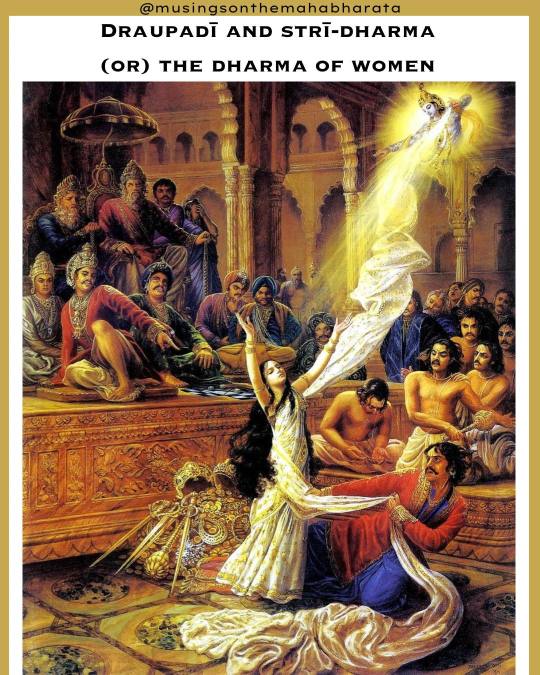
Draupadī and the Dharma of Women
"Strī" translates from Sanskrit as "woman", while "dharma" is a complex principle with manifold meanings, in this context bearing the significance of "duty"; in simple terms, it refers to an individual conduct that contributes to harmony in a greater framework, be it societal or cosmological.
Draupadī is lauded in the Critical Edition of the Mbh several times as being the epitome of strī-dharma, of the dharma of women. (2.62.20; 2.63.25-30; 2.64). Interestingly, she is most intensely praised as such after she angrily (yet elegantly!) questions the men of the royal court and demands justice, being anything but meek and demure. I would argue that this showcases that in the Mahābhārata voicing oneself and standing up for oneself are considered responsibilities belonging to the dharma of women.
To nuance this even more, Eknath Easwaran, an eminent translator of the Bhagavadgītā, highlights that, etymologically, the term "dharma" can be traced back to the root 'dhri', which means 'to support, hold up, or bear'; "dharma" therefore translates as "that which supports", and Draupadī's conduct therefore supports both society and cosmology.
In the Sanskrit Mbh, Kṛṣṇa does not appear in the sabhā (royal hall) at the time of Draupadī's attempted disrobing, and no direct mention of him is made during this episode. In a conversation with Dr. Brian Black, a Mbh researcher whom I had the honour to have as my MA supervisor, we talked about the implication of this, which is that Draupadī's adherence to strī-dharma appears to be that which shields her. A question that could arise here could be whether there is a contradiction between the Critical Edition and modern renderings of the Mahābhārata, with Draupadī being shielded by her dharma as opposed to by Kṛṣṇa.
For me there is no contradiction.
Kṛṣṇa in the Bhagavadgītā establishes himself as 'the eternal dharma' (14.27); and so, Kṛṣṇa is all dharmas, including strī-dharma. We tend to associate Kṛṣṇa with a fully-fledged incarnation; but he is beyond that. I would maintain that, as the divine principle, he exists in Draupadī's consciousness and in her actions as dharma (and not only!). The latter renditions, for me, in which he is physically there, only bring forth in tangible projections the internal process extending Draupadī's consciousness.
You can find me on IG: @musingsonthemahabharata.
Painting: Jadurani Dasi, 1986.
#mahabharata#mahabharat#draupadi#krishna#draupadi's disrobing#hindu art#mahabharatam#panchali#hindu mythology#hinduism#hindu#hindu philosophy#itihasa#sanskrit#phd#phd scholar#dharma#stri dharma#bhagavadgita#bhagavad gita#bhakti#vishnu
77 notes
·
View notes
Text
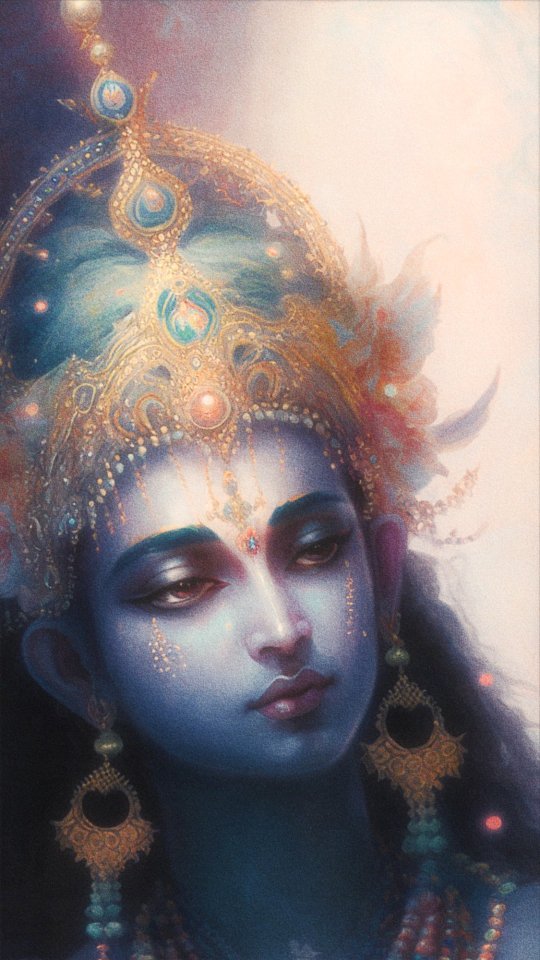
Something I find fascinating about the Critical Edition of the Mahābhārata is that the characters sporadically move from addressing Kṛṣṇa as an embodied mortal (as their friend, cousin, son-in-law etc) to addressing him as the Godhead; as Viṣṇu, as the Supreme Being, and as Īśvara. The succession of change between the modes of address can sometimes even happen on the same page, at a distance of a few lines. The veil is lifted, and the characters see through Kṛṣṇa’s illusion, and, through that, they become immersed in the nature of Reality; the veil promptly drops back, and God is lost. An argument for this could be that the divine modes of address are interpolations, a theory being that Kṛṣṇa became identified with Viṣṇu only in later renditions of the Mahābhārata. While this could be true at the level of historical analysis of the epic, for me, there is a subtler teaching encased here: how all of us, without exception, glimpse into the nature of Reality as we move through life, yet we perpetually proceed to return to becoming engrossed in the superimpositions we project upon Reality; and the dance continues. From Truth to dream, from dream to Truth. It is quite endearing, really. What committed and imaginative dreamers we are!
Adyashanti once talked about how one inadvertently glimpses truth; it is, after all, inescapable as it is our nature; the trick is not forgetting / losing the glimpse.
Gorgeous artwork of Kṛṣṇa: Awedict.
121 notes
·
View notes
Text
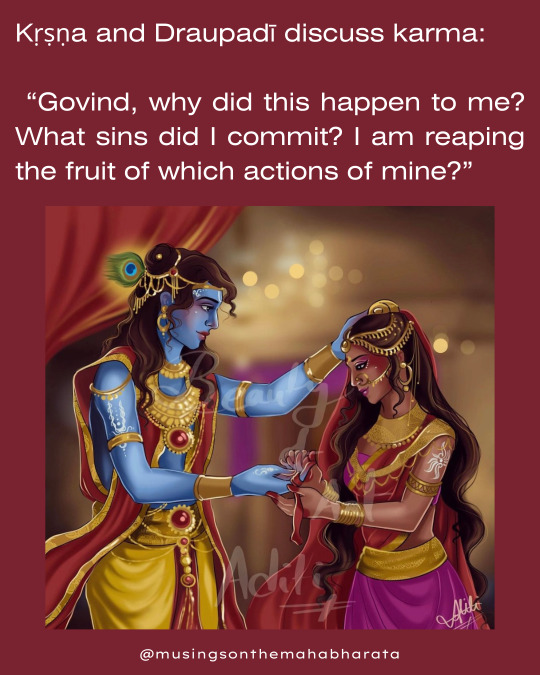
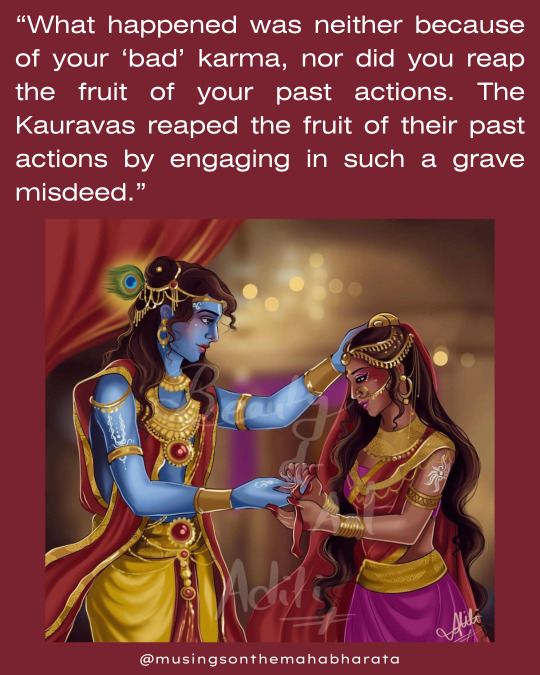
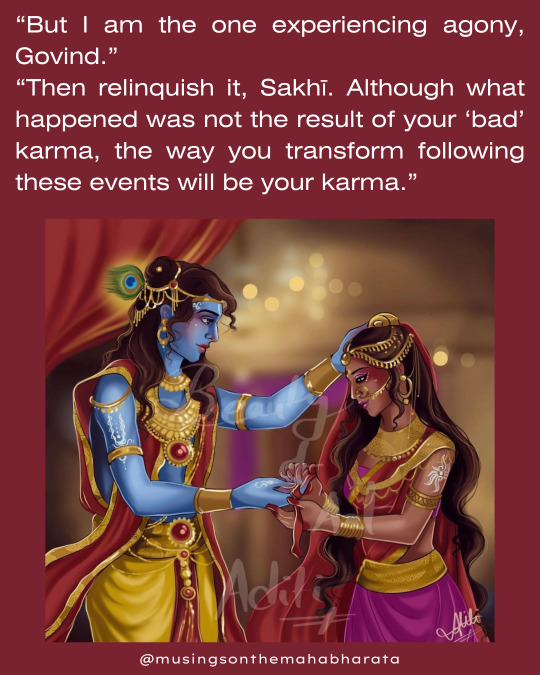
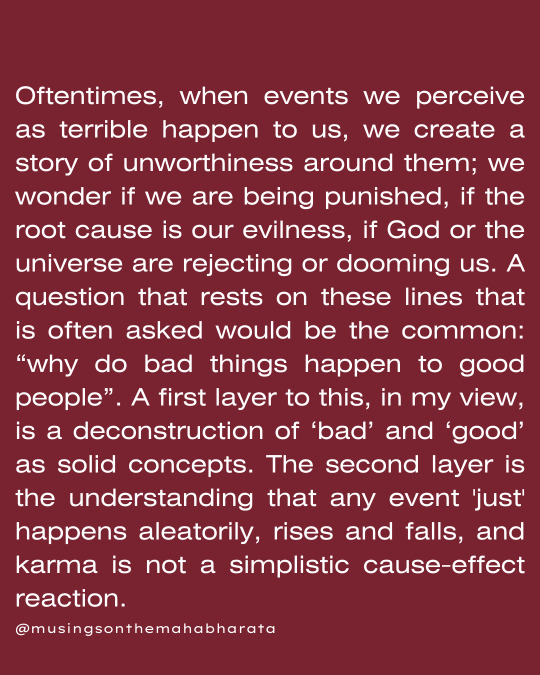
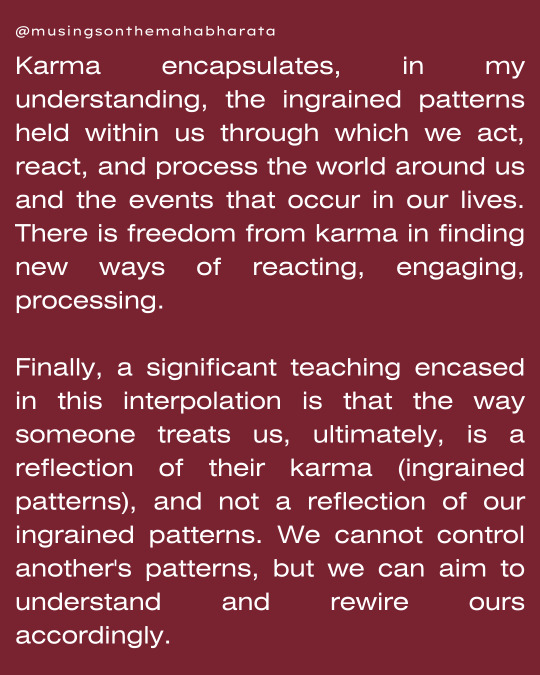
Kṛṣṇa and Draupadī Discuss Karma
One of my favourite interpolations from modern tellings of the Mahābhārata is a conversation between Draupadī and Kṛṣṇa that occurs after Draupadī's sexual assault and attempted disrobing by the Kauravas.
Clutching his feet, Draupadī sobs: "Govind, why? Why did this happen to me? What sins did I commit? I am reaping the fruit of which actions of mine?”
Picking her up and caressing her hair, Arya tells her: "What happened was neither because of your ‘bad’ karma, nor did you reap the fruit of your past actions. It was the Kauravas who reaped the fruit of their past actions by engaging in such a grave misdeed. Sakhī, this is the meaning of karma."
"But I am the one experiencing agony, Govind."
"Then relinquish it, Sakhī. Although what happened was not the result of your 'bad' karma, the way you transform following these events will be your karma."
This is such a beautiful and profound exchange which offers rich nuances to the teaching of karma. Oftentimes, when events we perceive as terrible happen to us, we create a story of unworthiness around them; we wonder if we are being punished, if the root cause is our evilness, if God or the universe are rejecting or dooming us. A question that rests on these lines that is often asked would be the common: “why do bad things happen to good people”. A first layer to this, in my view, is a deconstruction of 'bad' and 'good' as solid concepts. The second layer is the understanding that any event 'just' happens aleatorily, rises and falls, and karma is not a simplistic cause-effect reaction.
Karma encapsulates, in my understanding, the ingrained patterns held within us through which we act, react, and process the world around us and the events that occur in our lives. There is freedom from karma in finding new ways of reacting, engaging, processing.
Finally, a significant teaching encased in this interpolation is that the way someone treats us, ultimately, is a reflection of their karma (ingrained patterns), and not a reflection of our ingrained patterns. We cannot control another's patterns, but we can aim to understand and rewire ours accordingly.
The magnificent art: @beauty_of_art_aditi.
127 notes
·
View notes
Text
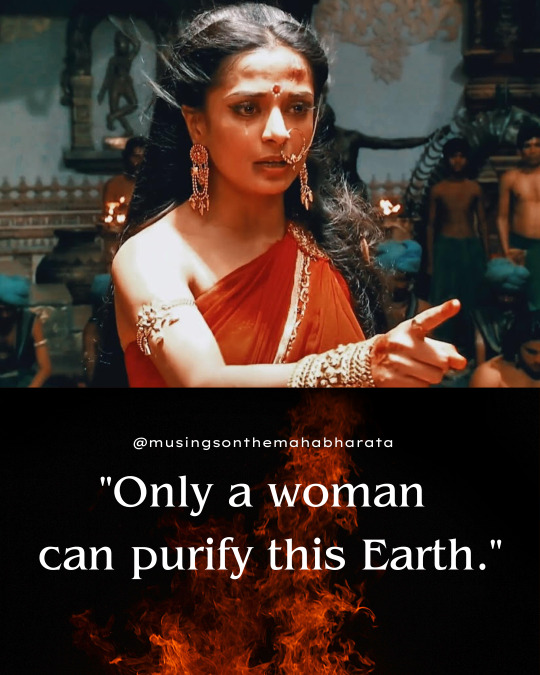
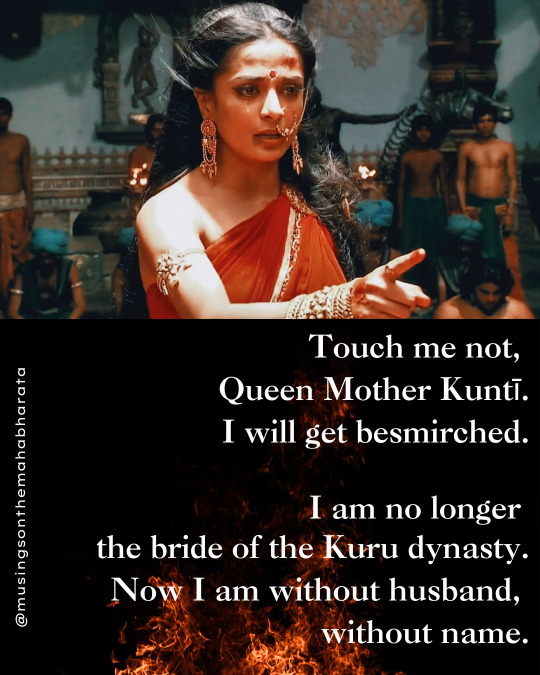
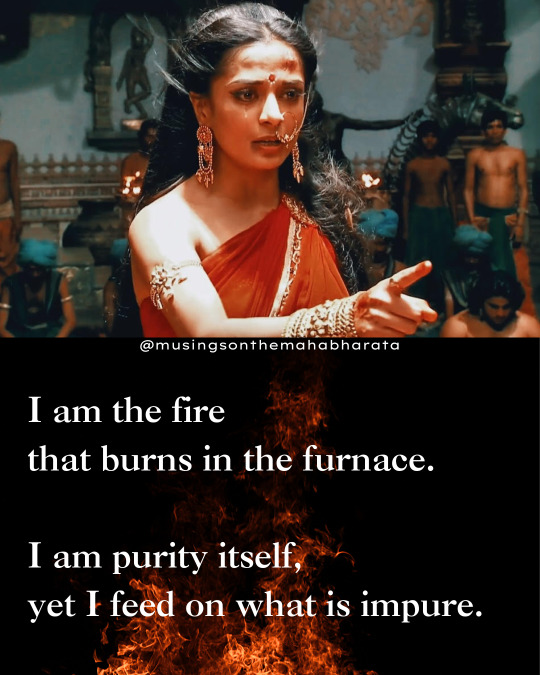
excerpt from an audio-translation I worked on with a colleague of mine; we translated Draupadī's imposing speech as rendered in modern Mahābhārat retellings. Draupadī utters this speech after she is dragged to the royal hall by her hair, and is assaulted & sexually harassed by the men of the Kuru dynasty. she renounces her status as a wife; in the Sanskrit Mbh, symbolically, by refusing to tie her hair again, while in modern renderings, explicitly, by directly renouncing her husbands who passively watched her humiliation.
in this sequence, Draupadī curses the Kurus. the curse bears similarities across the Sanskrit & modern tellings; that just as she bled in the sabhā (royal court / hall), so will all the men bleed on the battlefield, and just as she wept with her hair untied, so will their women cry before their corpses with their hair dishevelled (tied hair was the marking of a wife / bride, untied hair, of a widow).
photo: Pooja Sharma as Draupadī. Pooja is my Draupadī.
113 notes
·
View notes
Text

knowledge flows from teacher to student, and from student to teacher.
at the beginning of my academic journey, i was continuously surprised by the way the majority of our professors engaged with me and my colleagues; not only did they genuinely express interest in our opinions, but they also valued our input, ensured the openness of dialogue between us, and consistently encouraged us to become independent in thought and in writing. the learning environment i had been exposed to until then, namely secondary education in my home country, had been completely different: it had been one of strict hierarchy, in which plurality of thought was not existent, and in which the minds and experiences of students were not valued. it took me awhile to become used to – well, being valued, and to valuing my input myself.
i remember one particular exchange i had with a professor of mine, in which i expressed my understanding of one subject and proceeded to reflexively dismiss it by cloaking it in the “i am just a student, and who am i to say anything about this” garb. my professor stopped me and said something along the lines of: “yes, we are just people. but that doesn’t mean our contributions can’t be meaningful.”
the first week of my Ph.D. was similar: professors consistently reminded me and my colleagues that we are more than students, and they see us as valuable members of a research community that works together. they encouraged us to renounce our inhibitions, and to think, write and act as such.
it has become exceedingly important for me in my journey to be in such learning environments in which, past the roles of students and teachers that we play, there is an understanding of the flow of knowledge, which, in my view, would be limiting to think of as flowing rigidly in only one direction. knowledge flows from teacher to student, but also from student to teacher, and from student to student. i believe that to cut oneself off from receiving the flow from any source because of preconceived ideas of how it flows, and who to learn from, is a great loss.
sometime ago, i had a great conversation with my dear friend Avi Sato about how these same principles of knowledge flow apply in the area of spirituality as well, nuance which had long eluded me.
#knowledge#academia#wisdom#spirituality#teacher#student#guru#mentor#postgraduate#graduate#phd#phd life#phd thesis#phd student#professor
1 note
·
View note
Text
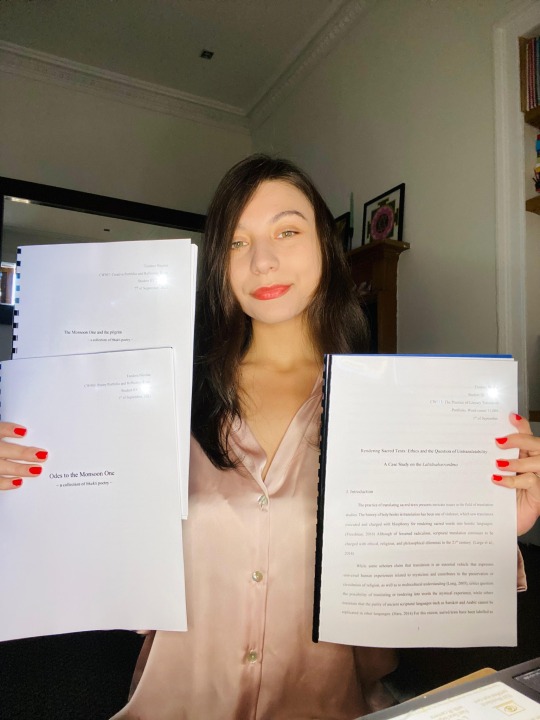
my second Master's Degree is officially COMPLETE!! these past two years at Warwick University were a rich immersion in the art of poetry & in the practice of literary translation. milestones achieved have been:
completing my dissertation, entitled "Rendering Sacred Texts: Ethics and the Question of Untranslatability", in which i explored the practice of translating sacred texts and the intricate issues it presents in the field of translation studies, mainly posed by the dilemma that is the hypothesis of an intrinsically sacred quality to languages such as Sanskrit or Latin. i argued that in the case of non-dual traditions, the subsequent question, of whether translation would defile the text, is incongruent with the philosophy & cosmology the text is rooted in. i used the Lalitāsahasranāma, a central hymn of Śrīvidyā, as a case-study.
conducting my poetic research centred on bhakti or devotional poetry, a genre of Indian poetry which worships the Divine as the Beloved. i worked on two bhakti collections: "odes to the Monsoon One" and "the Monsoon One and the pilgrim", which explore a woman’s mystical journey. written as a response to the lingering legacy of female exclusion from spirituality that is present literature, the poetry rebels against misogynistic religious texts thematically, through female-centred imagery deifying the demonised body, through the subversion of elements of oppression such as motifs of marriage. the Divine is worshipped in my poems as a lover. i argued that for as long as remnants of a religious culture exclusive of women persist in South Asian literature and practice, for so long will bhakti poetry be needed for devotional rebuttal.
more on this soon! i am hoping for these to be published in 2024 or 2025.
i extend my gratitude to my extraordinary professors: my supervisors Dr. Jodie Kim & Rosalind Harvey; Professor David Morley, as well as Dr. Chantal Wright, who generously & expertly encouraged and guided me, as well as expressed genuine interest in my work - interest which i especially appreciated when my work took unconventional routes!
as this chapter ends, a new one at Edinburgh begins! onward!
#masters degree#degree#masters#postgraduate#graduate#student#university#warwick university#edinburgh university#edinburgh#warwick#dissertation#poetry#translation#literary translation#spirituality#bhakti poetry#bhakti
14 notes
·
View notes
Text
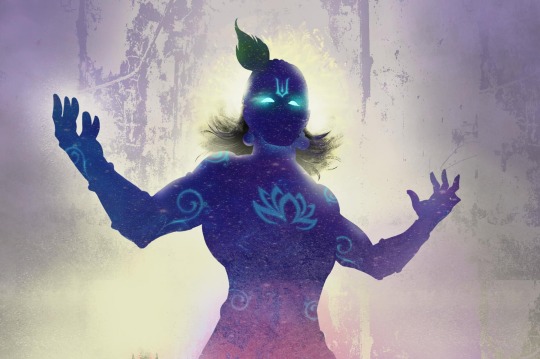
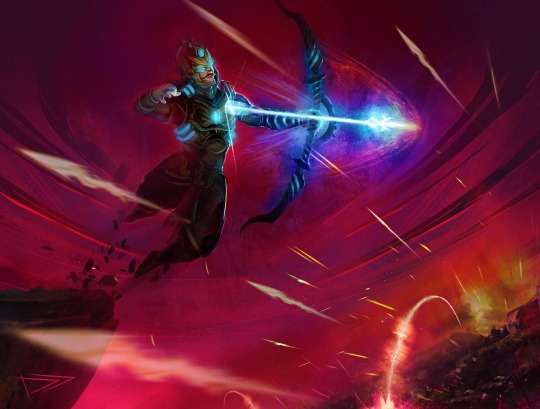
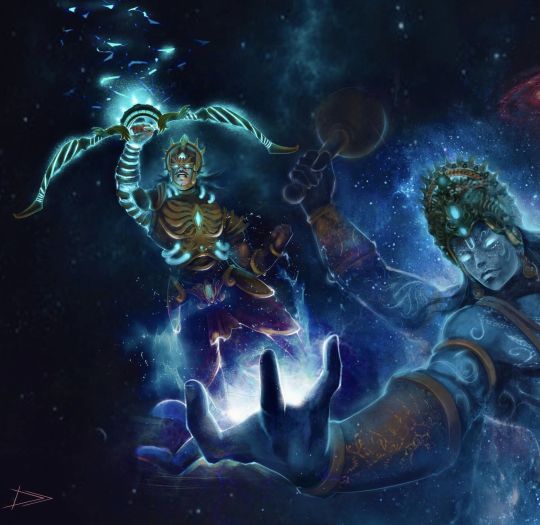
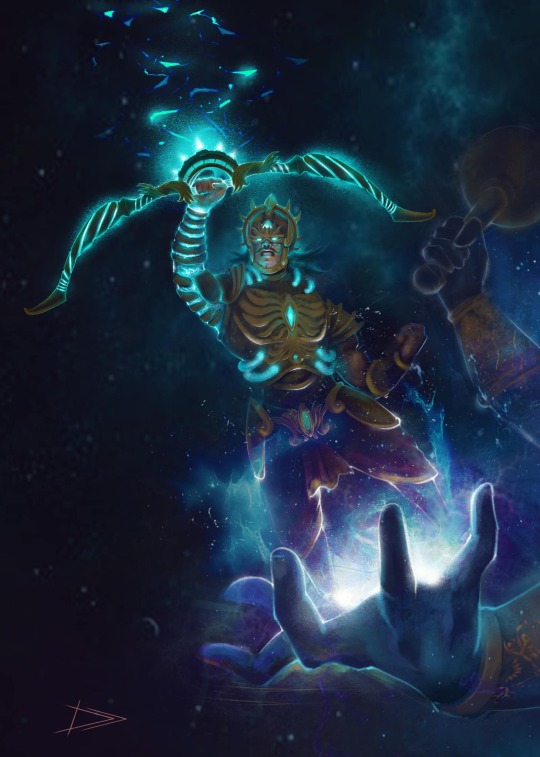
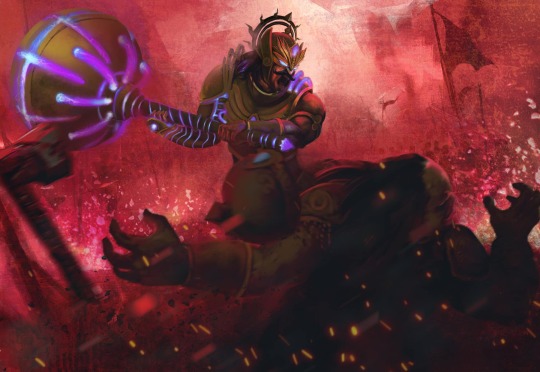
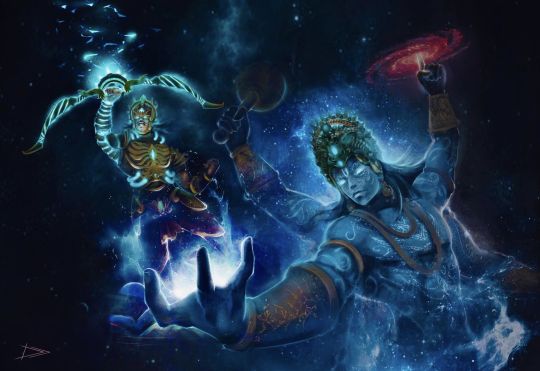
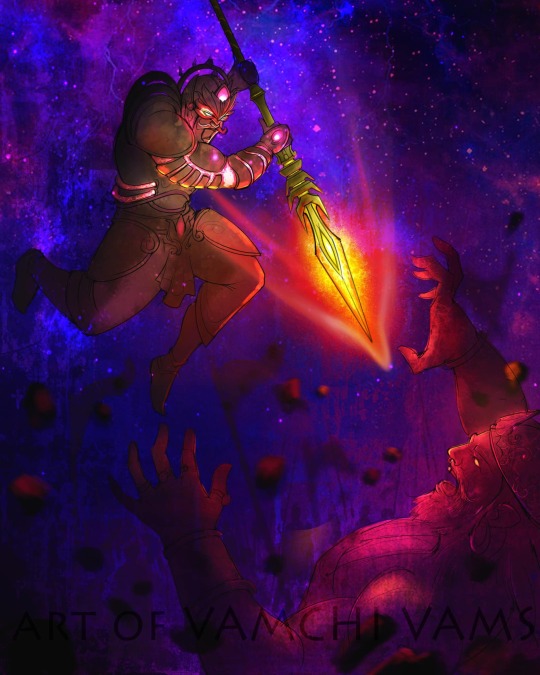
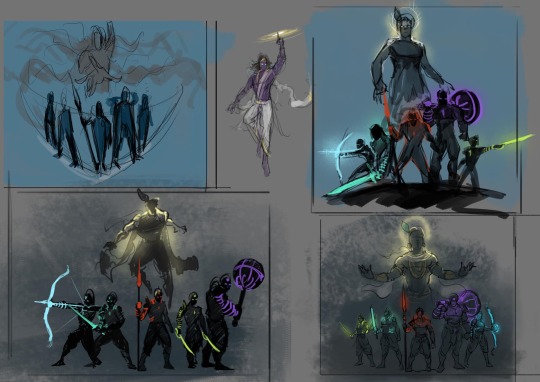
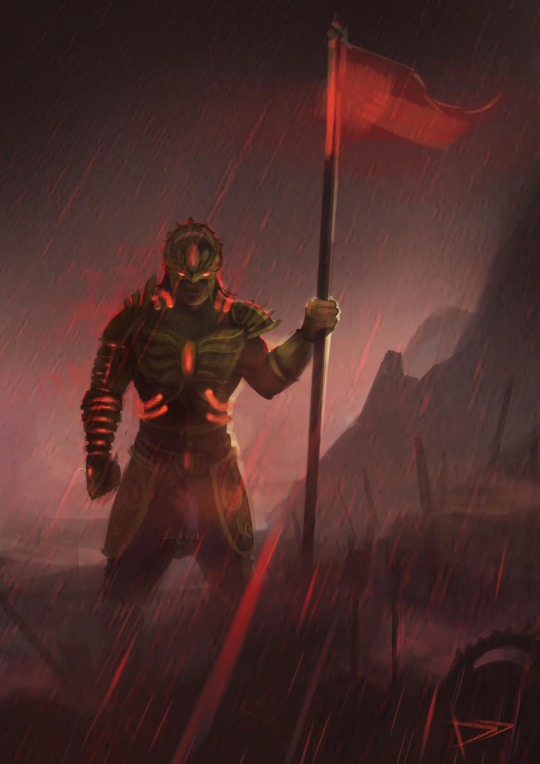
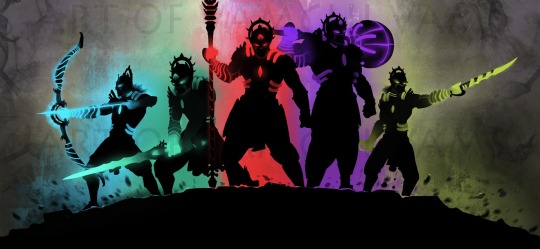
check out this stunning futuristic Mahābhārata art by Vamchi Vams!
the tendency with modern Mbh-inspired artwork is for it to still adhere to 'traditional' / historic conventions and for these to be seen as more 'accurate' renderings, but, especially with the war books (parvas), i'd maintain that one needs only to skim-read to see that the futuristic artwork most likely is a more 'accurate' representation of how the war is said to be fought. it would not be an exaggeration to claim that the astras (supranatural weapons imbued with mantras) used by warriors such as Arjuna, Karṇa & Aśvatthāmā functioned like nuclear weapons. i personally adore futuristic Mbh artwork because in my opinion it enlivens the epic & grounds it in our present as a timeless dynamic work and not as an ancient lifeless poem.
i do wonder if it is the inescapable archaic tone of 99% of the Mbh translations from sanskrit (which my dear friend Avi Sato pointed to me once & now i can't unsee!) that which contributes to this overall impression that traditional renditions * must * be more accurate. perhaps. i for one would love to see a truly futuristic translation and interpretation of the Mbh (both in literature & in film / TV) that also follows the narrative thread faithfully. might take it upon myself.
29 notes
·
View notes
Text
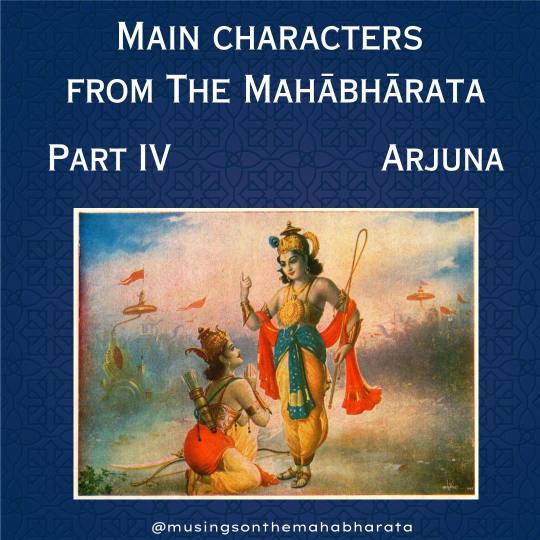

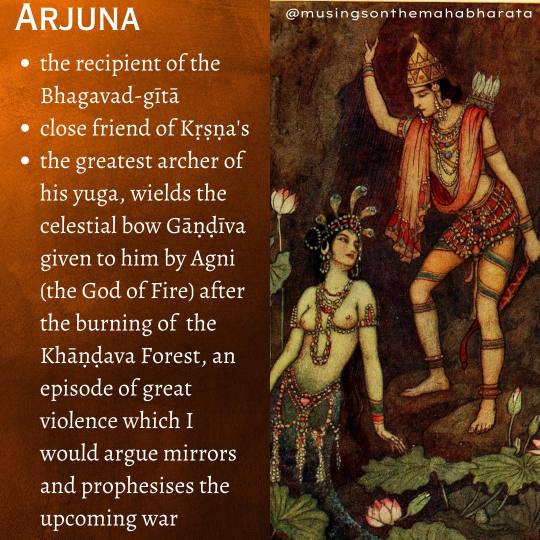
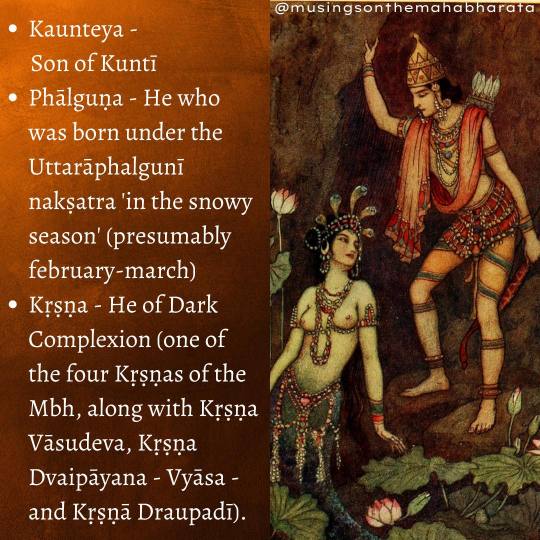

101 on Gāṇḍīvadhārī Arjuna, Maheṣvāsa Dhanañjaya.
he is perhaps best known as the recipient of the Bhagavadgītā and as a highly skilled warrior, but i find that he is often presented one-dimensionally in popular culture, and his well-rounded & complex, captivating nature is overlooked;
handsome, dark and curly-haired, Dhanañjaya (my favourite name of his!) is playful, assisting Kṛṣṇa in his exploits, in which they dress together as women and beguile all who encounter them;
brave and well-schooled in the laws of dharma, he concomitantly does not conceal his love for violence in episodes such as the burning of the Khāṇḍava forest, in which he delights in the unleashed carnage;
such an exciting hero - more below! and this barely scratches the surface!
15 notes
·
View notes
Text
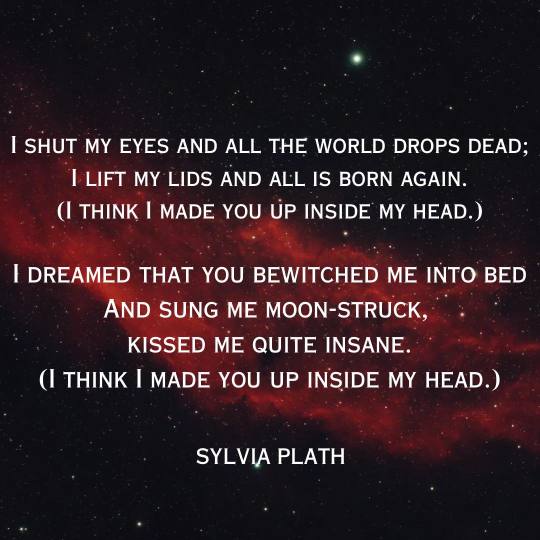
excerpt from my favourite poem by sylvia plath, mad girl's love song. i was reflecting today on how poetry holds multiple meanings which are all within us. this is why i love revisiting my favourites - as i change, so do they. for instance, as a teenager, this poem used to speak to my depression and disillusionment with life. now it reminds me of a verse from the Lalitāsahasranāma: unmeṣa nimiṣotpanna vipanna bhuvanāvaliḥ, N281, She of blinking eyes that birth and collapse the worlds (my very loose translation). so, on the contrary, it reminds me of the teaching pointing to the immense creative power & potential housed in each of us, through which we birth and dissolve the worlds and selves within us from moment to moment.
The stars go waltzing out in blue and red,
And arbitrary blackness gallops in:
I shut my eyes and all the world drops dead.
God topples from the sky, hell's fires fade:
Exit seraphim and Satan's men:
I shut my eyes and all the world drops dead
#sylvia plath#poetry#sylvia plath poetry#sylvia plath lovers#the bell jar#literature#writers#writing#quotes#beauty#female writers#female writer#sylvia plath quotes#poet#poetess#poems on tumblr#lalitasahasranama#srividya#goddess#nonduality
31 notes
·
View notes
